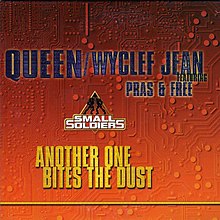Another One Bites the Dust
| "Another One Bites the Dust (Cedric Gervais & Second Sun Radio Edit)" |
|
Single by Queen vs. The Miami Project |
| from the album Another One Bites the Dust (The Miami Project Remixes)
|
| B-side |
"Another One Bites the Dust" (Original Version) |
| Released |
2006 |
| Format |
|
| Genre |
House |
| Length |
3:22 |
| Label |
Positiva |
| Writer(s) |
John Deacon |
| Producer(s) |
- Queen
- Mack
- Cedric Gervais
|
|
Queen singles chronology |
|
|
"Another One Bites the Dust" is a 1980 song by British rock band Queen. Written by bass guitarist John Deacon, the song featured on the group's eighth studio album The Game (1980). The song was a worldwide hit, charting number one on the US Billboard Hot 100 for three weeks, from October 4 to October 18 (their second number-one single in the country). The song spent fifteen weeks in the Billboard top ten (the longest running top ten song of 1980) and 31 weeks total on the chart (more than any other song in 1980). It reached number two on the Hot Soul Singles chart and the Disco Top 100 chart, and number seven on the UK Singles Chart. The song is credited as Queen's best-selling single, with sales of over 7 million copies. This version was ranked at number 34 on Billboard's All-Time Top Songs.
The song won an American Music Award for Favorite Rock Single and also garnered a Grammy Award nomination for Best Rock Performance by a Duo or Group with Vocal.
John Deacon's bass line was inspired by the song "Good Times" by the disco group Chic. In an interview with NME, Chic co-founder Bernard Edwards stated, "...that Queen record came about because that Queen bass player... spent some time hanging out with us at our studio".
Recording sessions were produced by Reinhold Mack at Musicland Studios in Munich (West Germany) and consisted of Deacon playing almost all the instruments: bass guitar, piano, rhythm and lead guitars and handclap percussion. Roger Taylor added a drum loop and Brian May contributed some noises with his guitar and an Eventide Harmonizer. There are no synthesisers used in the song: all effects are created with pianos, guitars, and drums, with subsequent tape playback performed in reverse at various speeds. Finally, some sound effects were run through the harmonizer for further processing. The effect of the harmonizer can be heard clearly in the "swirling" nature of the sound immediately before the first lyric. After attending a Queen concert in Los Angeles, Michael Jackson suggested to Freddie Mercury backstage that "Another One Bites the Dust" be released as a single. In early live performances, Taylor sang lead on the chorus, as opposed to the studio version sung entirely by Mercury. As the song became more well-known, the band could rely on audiences to sing the chorus by themselves.
...
Wikipedia


